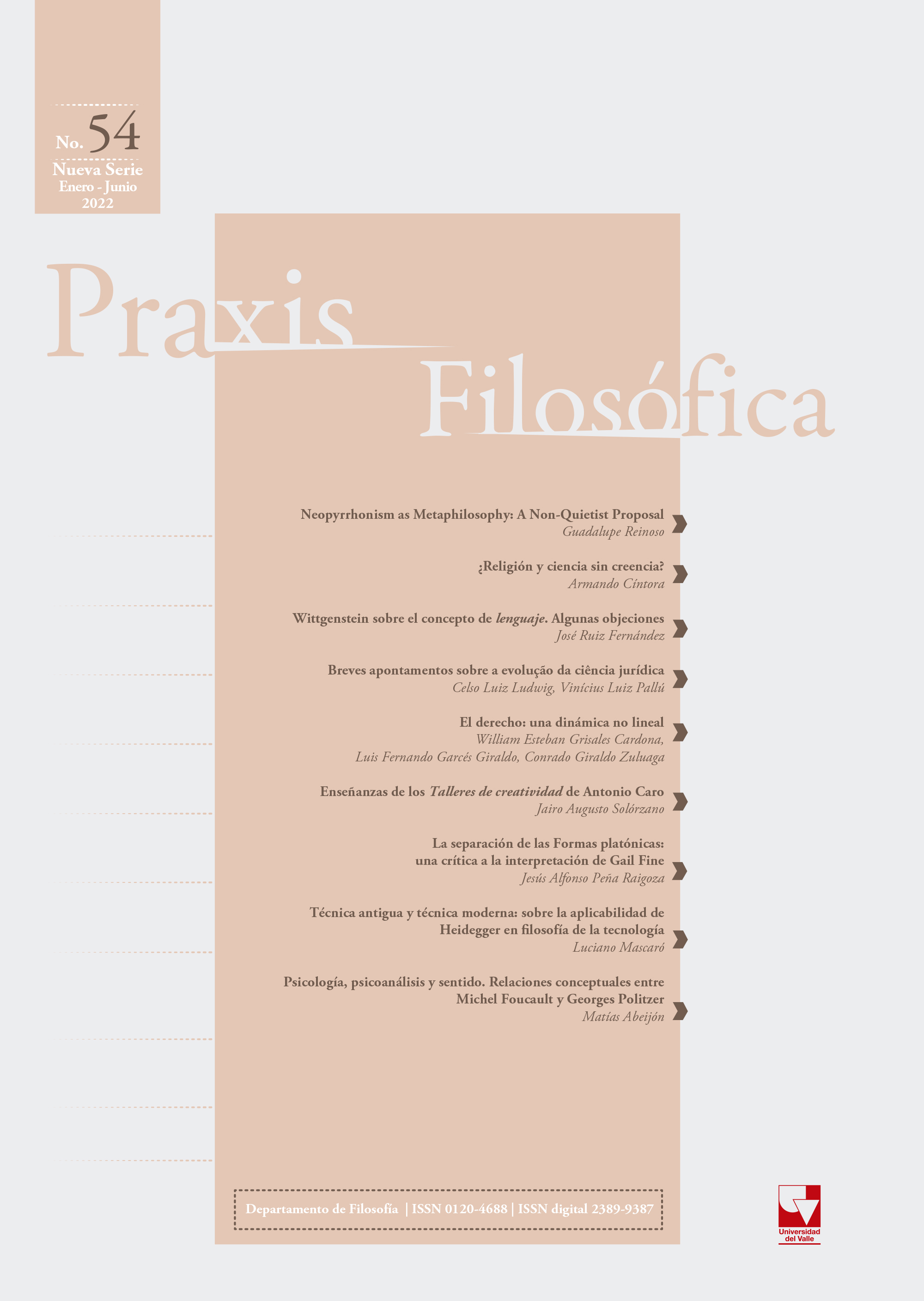Neopyrrhonism as Metaphilosophy: A Non-Quietist Proposal
Palabras claves:
Neopyrrhonism ; Metaphilosophy ; Quietism ; Philosophical Arguments ; Disagreements ;Contenido principal del artículo
Fogelin (2002 [1976]; 1992 [1981]; 1994) was the first one to speak about “Neopyrrhonism” to link Wittgenstein and Sextus Empiricus. To him, Pyrrhonism “combines philosophical scepticism with scepticism about philosophy, that is, to have doubts about philosophy on the basis of philosophical arguments” (1994, p. 3). Following this interpretation, Neopyrrhonism can be understood as a kind of scepticism that cancels philosophy using self-destructive arguments (peritrope). Both Sextus -with his proposal of suspension of judgment- and Wittgenstein -with his idea of the dissolution of philosophical problems- are representatives of quietism. Neopyrrhonism as quietism can be conceived of as a therapeutic proposal mainly based on not postulating an argumentative-constructive philosophical theory. Against this perspective, I propose interpreting Neopyrrhonism as Metaphilosophy, from which a performative proposal emerges. In this approach, Neopyrrhonism is an open-ended inquiry that implies the ability of using different philosophical argumentative strategies in a performative sense to encourage a new way of exercising philosophy.
Annas, J., & Barnes, J. (2000). Sextus Empiricus: Outlines of Scepticism. Cambridge University Press.
Barnes, J. (1990). The Toils of Scepticism. Cambridge University Press.
Bett, R. (2019). How to be A Pyrrhonist. The Practice and Significance of Pyrrhonian Skepticism. Cambridge University Press.
Bueno, O. (2013). Disagreeing with the Pyrrhonist? In D. Machuca (Ed.), Disagreement and skepticism (pp. 24-45). Routledge.
Bury, R. G. (1933). Sextus Empiricus. In Four Volumes. Harvard University Press.
Cavell, S. (1976). Must we mean what we say? A Book of Essays. Cambridge University Press.
Cavell, S. (1979). The Claim of Reason. Oxford University Press.
Crary, A. (2000). The New Wittgenstein. Routledge.
Coliva, A. (2010). Moore and Wittgenstein: Scepticism, Certainty, and Common Sense. Palgrave Macmillan.
Double, R. (1996). Metaphilosophy and Free Will. Oxford University Press.
Fogelin, R. (2005 [1985]). The Logic of Deep Disagreements. Informal Logic 25 (1), 3–11. https://doi.org/10.22329/il.v25i1.1040
Fogelin, R. (1992 [1981]). Wittgenstein and Classical Scepticism. International Philosophical Quarterly, 21, 3-15. Republished (1992), Philosophical Interpretation (pp. 214-231). Oxford University Press.
Fogelin, R. (1994). Pyrrhonian Reflections on Knowledge and Justification. Oxford University Press.
Fogelin, R. (2002 [1976]). Wittgenstein [Second edition]. Routledge & Kegan Paul Ltd.
Fogelin, R. (2006) Wittgenstein’s critique of philosophy. In H. Sluga & D. Stern, (Eds.), The Cambridge Companion Wittgenstein (pp. 34-58). Cambridge University Press.
Gutschmidt, R. (2020). Beyond Quietism: Transformative Experience in Pyrrhonism and Wittgenstein. International Journal for the Study of Scepticism, 10, 105-128.
James, W. (1908). Pragmatism: A New Name for Some Old Ways of Thinking, Longmans, Green and co.
Lazerowitz, M., & Mabrose, A. (1984). Free Will. In Revista Hispanoamericana de Filosofía, Vol. 16, No. 48, pp. 3-17.
Machuca, D. (Ed.). (2013): Disagreement and skepticism. Routledge.
McDowell, J. (2009) Wittgensteinian “Quietism”. Common Knowledge, 15 (3), 365-372. https://doi.org/10.1215/0961754X-2009-018
Moyal-Sharrock, D. (Ed.) (2004a). The Third Wittgenstein. Routledge.
Moyal-Sharrock, D., & Brenner, W. H. (2005). Readings of Wittgenstein's On certainty. Palgrave Macmillan.
Nussbaum, M. (1986). “Therapeutic Arguments: Epicurus and Aristotle”. In M. Schofield & G. Striker (Eds.), The Norms of Nature: Studies in Hellenistic Ethics (pp. 31–74). Cambridge University Press.
Pritchard, D. (2020). “Pyrrhonism and Wittgensteinian Quietism”. In Ancient Scepticism and Contemporary Philosophy.. (eds.) L. Perissinotto & B. R. Cámara.
Italy.Mimesis International, (forthcoming). Available in https://www.academia.edu/43925914/PYRRHONISM_AND_WITTGENSTEINIAN_QUIETISM
Pritchard, D. H. (2005). Wittgenstein’s On Certainty and Contemporary Anti-Scepticism. In D. Moyal-Sharrock & W. H. Brenner (Eds.), Investigating On Certainty: Essays on Wittgenstein’s Last Work (pp. 189-224). Palgrave Macmillan.
Powers, N. (2010). The System of the Sceptical Modes in Sextus Empiricus. APEIRON, a Journal for Ancient Philosophy and Science, 43(4), 157-172. https://doi.org/10.1515/APEIRON.2010.43.4.157
Reese W. L. (1990). Morris Lazerowitz and Metaphilosophy. Metaphilosophy, 21(1 & 2), 28-42.
Reinoso, G. (2018). Las preguntas metafísicas y otras enfermedades filosóficas: Wittgenstein y el pirronismo. Sképsis Revista de Filosofia, IX(17), 99-113.
Smith, P. J. & Bueno, O. (2016). Skepticism in Latin America. E. N. Zalta (Ed.), The Stanford Encyclopedia of Philosophy (Spring 2016 Ed.). https://plato.stanford.edu/archives/spr2016/entries/skepticism-latin-america/
Stroll, A. (1994). Moore and Wittgenstein on certainty. Oxford University Press.
Watson, R. A. (1969). Sextus and Wittgenstein. Southern Journal of Philosophy, 7(3), 229–237.
Wittgenstein, L. (1958). Philosophical Investigations. Basil Blackwell.
Wittgenstein, L. (1965). Blue and Brown Books. Harper Perennial.
Wittgenstein, L. (1969). On Certainty. Basil Blackwell.
Wittgenstein, L. (1989). A Lecture on Freedom of the Will. Philosophical Investigations, 12(2), 85-100. https://doi.org/10.1111/j.1467-9205.1989.tb00265.x
Wittgenstein, L. (2005). The Big Typescript TS 213. Blackwell Publishing.
Wright, C. (1989). Critical Notice of Colin McGinn: Wittgenstein on Meaning. Mind, 98, 289–305.
Wright, C. (1992). Truth and Objectivity. Harvard University Press.
Wright, C. (2001) Rails to Infinity: Essays on Themes from Wittgenstein’s Philosophical Investigations. Harvard University Press.
Aceptado 2022-02-04
Publicado 2022-03-15

Esta obra está bajo una licencia internacional Creative Commons Atribución-NoComercial-SinDerivadas 4.0.
De acuerdo con nuestra política (Licencia Creative Commons CC BY-NC-SA 4.0) los artículos presentados y sometidos al proceso editorial en la revista Praxis Filosófica no tienen costo alguno para sus autores ni retribuciones económicas para la revista. El artículo de carácter inédito, producto de investigación o de algún proyecto que se presente a Praxis Filosófica, no podrá estar sometido a otro proceso de publicación durante el proceso que se lleve en nuestra revista.





